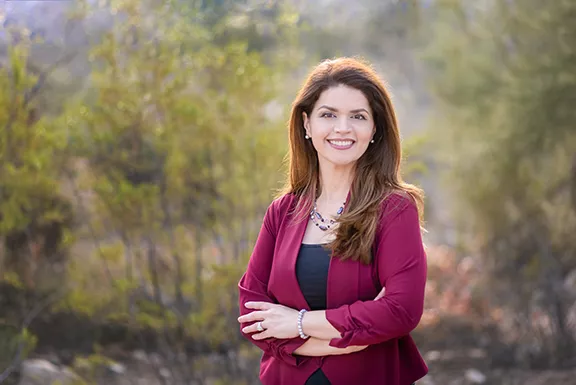Greeted by cheers of si se puede! inside a packed American Eat Co., where Romero hosted an election night watch party, she thanked the people who helped on her campaign.
"I'm so proud of the campaign we had because nobody gets to this point without all of you; nobody does," she said. "We first started knowing it would be a difficult road but we said our campaign is going to be people powered, and it is."
Romero captured 49 percent of the vote, compared to Farley's 38 percent, in a primary race that saw roughly 38 percent of Democrats turn out to vote. When you get right down to it, the three Democrats in the primary did not differ a great deal on major policy issues facing the city, so voters likely made their decisions on other factors. It didn't hurt Romero that voters—all other things being equal—seem to lean toward women and people of color these days. Nor did it hurt that Romero had a lot of support from third-party campaign organizations that jumped in to support her candidacy.
On Election Night, Romero thanked the other candidates and spoke of her desire to bring together the Democratic party.
"When we are united we are most powerful and I want to keep supporting the other candidates," she said. "I open the door to continue working with all of you."
Keeping the party united will be key to whether Romero wins in November. While she doesn't face a Republican in the general election, she does have to get past independent candidate Ed Ackerley. (Green Party candidate Mike Cease may have also received enough votes as a write-in candidate to earn a spot, although the Tucson City Clerk's Office tells The Skinny they won't say for sure until later this week, after our deadline.)
Romero's victory is the best outcome for Ackerley's chances. The lifelong Democrat—he changed his voter registration to independent before launching his mayoral campaign—is hoping to replicate Republican Bob Walkup's unlikely victory way back in the 1999 mayor's race, when the rookie politician pulled off a win despite the fact that Democrats had (and still have) a significant voter-registration advantage in the city limits.
Walkup won that race because former city councilmember Molly McKasson emerged from a contentious four-way Democratic primary that left some bruised feelings among supporters of the unsuccessful candidates. In addition, McKasson was perceived as being too far to the left and too unfriendly to business. She also supported a proposition related to recharge of CAP water that turned out to be unpopular with voters.
Whether Ackerley, a longtime ad man and UA prof involved in numerous charity efforts over the years, can replicate Walkup's formula remains to be seen. But Romero is definitely taking steps to avoid McKasson's fate.
During her 12 years on the Tucson City Council, critics have called Romero a disaster for the business community. And she's well aware of that reputation. She will often steer conversations about city issues toward the importance of economic development. She likes to point out that her voting record mirrors that of biz-friendly Mayor Jonathan Rothschild.
Romero has also made a point of opposing the controversial Families Free and Together proposition, aka Prop 205, aka Tucson's Sanctuary City proposition, which would limit how Tucson police could interact with federal immigration authorities. The prop has already proved divisive among Tucson Democrats, with Romero and the rest of the City Council opposing it because they say it is unnecessary as they have already done all they can to work around what remains of Arizona's notorious SB 1070 "show me your papers" immigration law. They argue it will damage Tucson's rep and could easily lead to problems from both the Trump administration and the Arizona Legislature. Supporters—including the Pima County Democratic Party—say that it is necessary both a symbol of resistance and because even with the changes that the council has made to TPD's general orders, immigrants still live in fear in Tucson.
While the battle over Prop. 205 will be the biggest issue on the November ballot, Ackerley will keep the mayor's race in the spotlight. Whether he can win over Republicans, independent voters and a portion of unhappy Democrats is the second-biggest question voters will answer in November. ■













